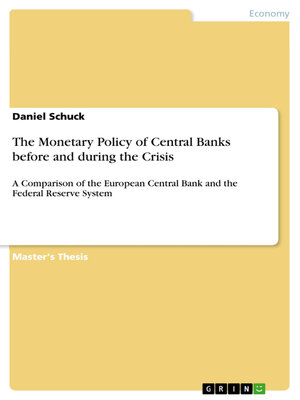The Monetary Policy of Central Banks before and during the Crisis
ebook ∣ A Comparison of the European Central Bank and the Federal Reserve System
By Daniel Schuck

Sign up to save your library
With an OverDrive account, you can save your favorite libraries for at-a-glance information about availability. Find out more about OverDrive accounts.
Find this title in Libby, the library reading app by OverDrive.



Search for a digital library with this title
Title found at these libraries:
| Library Name | Distance |
|---|---|
| Loading... |
Master's Thesis from the year 2014 in the subject Economics - International Economic Relations, grade: 1,2, University of Applied Sciences Saarbrücken (Faculty of Business and Economics), language: English, abstract: The Federal Reserve System and the European Central Bank were both forced to implement unconventional monetary policy measures as a response to the severe impact of the global financial crisis and its aftermath. In the first stage of the global financial crisis, the conventional and unconventional monetary policy measures implemented by the Federal Reserve System and the European Central Bank were fairly similar. Both central banks focused on providing the banking sector with liquidity in order to restore interbank lending as it was a key element of ensuring a functional monetary transmission mechanism. However, when the global financial crisis transformed to a sovereign debt crisis in the euro area in 2010, the European Central Bank faced increasing divergence in sovereign spreads and the potential insolvency of euro area Member States. Therefore, its unconventional monetary policy measures focused on credit easing by purchasing sovereign as well as covered bonds in order to improve banks' and governments' funding costs. By contrast, the Federal Reserve System massively purchased government bonds and focused on decreasing interest rates and asset prices through the use of quantitative easing.







